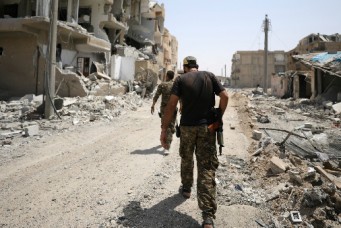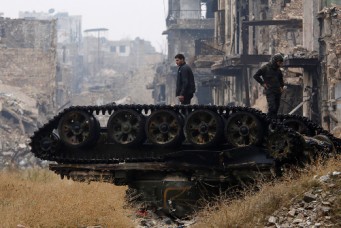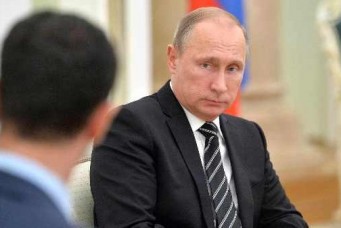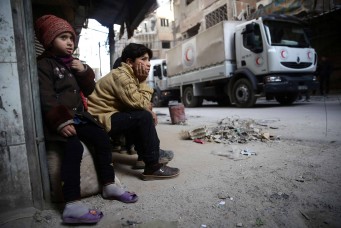The Fall of Aleppo
Syrian rebels are unlikely to rebound from defeat anytime soon, while Iran and Russia stand to gain immensely.
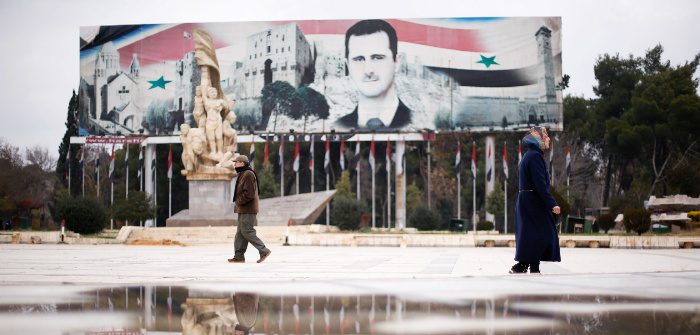
A billboard depicting President Bashar Al-Assad in the government controlled area of Aleppo, Syria, Dec. 17, 2016. Omar Sanadiki/Reuters
Aleppo has fallen to Bashar Al-Assad’s forces, battered by unrelenting Russian bombardment and surrounded by Shiite militias from Syria, Lebanon, Iran, and Iraq. The Syrian regime is poised to reap the rewards of this regional and international onslaught. The rebels’ goal of ousting President Al-Assad has now become virtually impossible, at least in the near term. To be sure, there are further battles to be fought in Syrian territory still beyond the reach of the regime. Idlib is likely the next battlefront, but one can already project an empowered Syria-Iran-Russia axis planning the next steps ahead.
Toward the end of 2012, when Syrian rebel resistance to Al-Assad was gaining in strength and pressing hard against the regime’s bastions in Damascus and Latakia, the regime’s military strategy, no doubt recommended by Iran and Hezbollah, was to secure a line of defense around Syria’s major urban centers that would stretch from the Turkish border in the north to the Jordanian border in the south. Hezbollah started the process by besieging and taking the town of Qusayr in the summer of 2013.
This was a strategic turnaround for the regime, the significance of which the Barack Obama administration completely missed. By not intervening or helping the opposition hold on to Qusayr, the United States allowed the regime to stop arms smuggling to the rebels via Tripoli and the Lebanese border. Qusayr also helped consolidate a defensive line between Latakia and Damascus, allowing the regime to protect its core areas. The three years that followed saw the regime further strengthening its defenses along the Lebanese borders guaranteeing free movement for Hezbollah in and out of Syria.
Iran and Hezbollah have now guaranteed through their steadfast assistance the survival of their ally in Syria, and have thus ensured the consolidation of their triangular axis in the face of domestic, regional, and international adversaries, this time fully backed by Russia. Russia has in turn guaranteed for itself a strong foothold in the region.
On the other side, Al-Assad’s adversaries are increasingly unable to sustain their positions. Turkey, after shooting down a Russian plane in late November 2015, went on a fence-mending campaign with Moscow and could not, after the latter put in place the S400 anti-aircraft system, sustain any military role that might antagonize Russia—especially since Turkey knew it did not have the full backing of its NATO allies. Turkey’s assistance to the Syrian opposition has therefore been gradually receding, with its sole realistic goal being to block Syria’s Kurds from establishing an independent enclave all along Turkey’s border with Syria. Turkey’s originally stated opinion, that Al-Assad must go, has become just that, an opinion, much like that of President Obama. The election of Donald Trump in the United States further dissuades Turkey from holding on to its original goal.
Saudi Arabia, meanwhile, is embroiled in Yemen with decreasing foreign reserves—which are reportedly down from a pre-war $700 billion to possibly half that amount—and is facing the prospect of weaker American backing due to the anticipated pro-Russian policies of President-elect Trump. Riyadh will find it increasingly unrealistic to offer any serious assistance to the Syrian opposition. Depressed oil prices have further put a crimp in the kingdom’s ability to project its influence in the region.
Predicting Trump’s foreign policy remains a challenge. There are conflicting tendencies within his incoming administration, and differences between his ideas and those of the majority Republicans in Congress. Trump wishes to work with President Vladimir Putin, especially on counterterrorism in the Middle East. At the same time, Trump and some of his closest advisors are vehemently anti-Iran. How they will reconcile these tendencies in the face of Russia’s virtual alliance with Tehran is only a matter of speculation at this point. One thing seems certain, nonetheless: the total lack of sympathy in the Trump camp toward the entire Syrian opposition. Indeed, Trump has repeatedly voiced a disdain for the democratic forces unleashed by the Arab uprisings of 2011, and even more disdain for any American support for regime change and democracy movements in the Middle East.
With the Islamic State in Iraq and Syria (ISIS) on the retreat, there was theoretically a chance for Syria’s opposition to regroup itself in the Syrian town of Raqqah and form a solid block against the regime. The chances of that happening, however, are now significantly less than they were a few months ago. More likely, the regime will push on to Idlib after Aleppo is completely taken, and then, having consolidated the western third of Syria, move on to recapture the rest of the country district by district, further devastating the civilian population and infrastructure of the country in the process.
Given an empowered Syria-Iran-Hezbollah axis, one could logically expect the consolidation of Iran’s influence in Lebanon and Iraq, an Iranian push to strengthen the Shiite community in Bahrain, and more effective Iranian support for the Houthi rebels in Yemen. The victorious allies can be expected to push their advantage on the ground through both military and covert means.
The regional rivalry between Saudi Arabia and Iran can be expected to continue by lethal and non-lethal means for the next decade, with the balance of power tilting further in the latter’s favor. The Sunni insurgency, however, will likely continue against Shiite militias in Iraq and the entrenched regime in Syria. This turmoil will continue to breathe life into extremist organizations, but the odds against an Islamist caliphate are increasingly high as ISIS loses its grip on what territory it still holds.
Nabeel Khoury is non-resident senior fellow with the Rafik Hariri Center for the Middle East at the Atlantic Council. He has contributed to the Middle East Journal, Journal of South Asian and Middle Eastern Studies, International Journal of Middle East Studies, and Middle East Policy. On Twitter:@khoury_nabeel.

